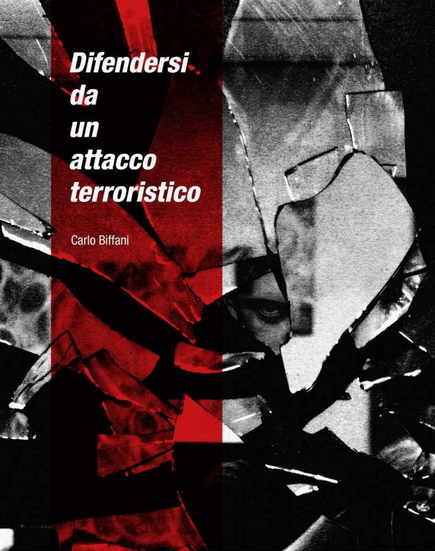
Presentation of the book "Defending yourself from a terrorist attack"
“If we present the actions of the Daesh (or Isis) terrorists, as we have done thus far, as if they were great invincible warriors, we would be telling a lie, and would just provide them with support in the form of communication. We have let ourselves be attacked and sometimes killed by incompetents”.
This is the first provocation by Carlo Biffani, author of “Difendersi da un attacco terroristico” (“Defending Yourself from a Terrorist Attack”), with respect to a reality that must be grasped if we want to know our enemy and fight him. This book is a short manual for emergency measures to counter terrorism, in Italian and English, with fifty pages going straight to the heart of the matter.
The author, a security expert, has been working for many years in the Risk Assessment and Risk Mitigation sectors for individual customers, companies and other organizations, and has collaborated with the Parliamentary Committee for the Security Services and the Senate Defense Committee, and with various universities.
"How to defend yourself from a terrorist attack" is not just a manual but also a training and study day regarding defensive strategy and the type of behavior suitable in the prevention and the reaction stages.
The terrorist threat in the West, from what is generally referred to as Daesh (or commonly Isis), has changed since the time of Al Qaeda and Bin Laden. The latter was acting on the basis of an ideology and with trained members who were part of a paramilitary organization with a clear, planned intention to strike. Today, however, those who attack us in our homes and whom we will be facing in the coming years lack military training, they have an AK 47 which they sometimes don’t know how to use when it jams; they have an underlying fanaticism and the desire to form part of something vague they call the Caliphate rather than an ideology as we understand it. They are the so-called lone wolves. They undoubtedly hate us and want to kill us, but their tactical training is ridiculous, which makes them all the more dangerous.
We have to learn how to defend ourselves by implementing our defensive strategies. The first one is the awareness that these people are not great warriors, and of how to save ourselves if we happen to be in their trajectory. Knowing your enemy, which means knowing whether or not he is alone, if he has a short or long weapon, what language he speaks, whether he has a backpack that might contain explosives or just a knife, if the first rule to be able to counter him. This is the type of strategy we can find in Sun Tzu’s “Art of War”; and Biffani highlights this. Without any need to study 6th cent. BC China, he makes his own experience available to ordinary people.
Today, terrorism is improvised, as J.R. James points out, and even Intelligence finds it hard to understand their moves. Today all you need is a truck, and even without putting C4 explosives on it, it can be made lethal if driven into a crowd, which is impotent. As all the instructors point out, people are not so interested in Intelligence work as in having someone who can defend them: “Biffani’s book is based on an important concept, prevention: acting and not reacting”, James pointed out.
Whether it is an attack by a truck against a crowd or a massacre like the Bataclan in Paris, it is always a matter of people who are “…highly dangerous, determined, but actually just actors with respect to what they want us to believe they are. Monstrously ferocious, often heavily drugged, who can spread terror only when they act against unarmed members of the public. It is time to explain how unarmed civilians can try to defend themselves”, writes the author.
We implement a defensive strategy in day to day like, for example when we try not to slip or when we protect our hands when we lift a boiling pot. We just have to extend our awareness, until looking around us to survive becomes as natural as drinking a glass of water. A blink of the eye, a look around and then we go back to doing what we want, laughing and having fun, this is the best way to respond to the crazies who want to take away our good sense and sleep out of fear.
If we find ourselves in the middle of a terrorist attack, the first step is to find safe cover like a planter or a large wall to avoid gunfire, preferably after identifying emergency exits, a concept stressed by firefighters with a view to specific intervention. In an event with lots of people like a concert, it is best to wear closed shoes which allow for evacuation without getting hurt. If you are trapped in a location, turn off the cellphone ringer and set for energy saving, and give the alarm as soon as possible. Do not escape by running for long stretches along a straight line. We can estimate that the special forces may intervene in a few minutes to free us, and when they come we can collaborate by adopting a crouching position with our hands clearly visible.
The book examines the various cases of terrorist attack, analyzing the attacks in recent years in France, Belgium or Turkey and giving advice on how to get out of them if we were involved in a similar case. This book is easy to read, and could also be recommended to school children, being written by an expert with an attractive use of language.
Fear is a lack of knowledge. And considering that we will have to face up to and live with this type of terrorist threat, knowing just who we are facing and being aware that we can over come these situations is important, if only to continue to live our lives (as in the case of Israel) rather than being afraid to leave our homes, as the terrorists would like.
In his book, Biffani provides information and advice, urging us to live our lives beyond fear.
https://www.amazon.it/Difendersi-attacco-terroristico
[Da un'intervista fatta a Carlo Biffa da Giusy Federici - https://www.difesaonline.it/evidenza/recensioni/carlo-biffani-difendersi-da-un-attacco-terroristico ]



